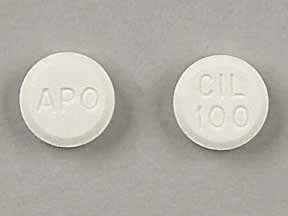
Cilostazol Coupons & Savings Card – Discount Prices from $37.27
My prescription
Edit
100MG, Cilostazol (180 Tablets)
Select pharmacy

CVS
$39.80
COUPON PRICE
Albertsons
$37.27
COUPON PRICE
Walgreens
$41.04
COUPON PRICE
Walmart
$62.93
COUPON PRICECilostazol savings card
Show this card to your pharmacist
Albertsons
$37.27
BIN
ID
PCN
GRP
015995
LHKPP600083
GDC
DR33
Powered by
More prescriptions for peripheral artery disease
More prescriptions for peripheral artery disease
Cilostazol dosage forms
Dosage Quantity Price from Per unit 50MG 1 Tablet $9.11 $9.11 50MG 30 Tablets $12.39 $0.41 50MG 50 Tablets $14.65 $0.29 50MG 60 Tablets $15.78 $0.26 50MG 90 Tablets $19.17 $0.21 50MG 120 Tablets $22.56 $0.19 50MG 180 Tablets $34.66 $0.19 100MG 180 Tablets $37.90 $0.21 100MG 1 Tablet $9.13 $9.13 100MG 50 Tablets $15.40 $0.31
| Dosage | Quantity | Price from | Per unit |
|---|---|---|---|
| 50MG | 1 Tablet | $9.11 | $9.11 |
| 50MG | 30 Tablets | $12.39 | $0.41 |
| 50MG | 50 Tablets | $14.65 | $0.29 |
| 50MG | 60 Tablets | $15.78 | $0.26 |
| 50MG | 90 Tablets | $19.17 | $0.21 |
| 50MG | 120 Tablets | $22.56 | $0.19 |
| 50MG | 180 Tablets | $34.66 | $0.19 |
| 100MG | 180 Tablets | $37.90 | $0.21 |
| 100MG | 1 Tablet | $9.13 | $9.13 |
| 100MG | 50 Tablets | $15.40 | $0.31 |
| 100MG | 60 Tablets | $16.68 | $0.28 |
| 100MG | 90 Tablets | $20.52 | $0.23 |
| 100MG | 500 Tablets | $63.80 | $0.13 |
| 100MG | 1200 Tablets | $116.30 | $0.10 |
| 100MG | 5000 Tablets | $401.30 | $0.08 |
Cilostazol Warnings
When considering the use of cilostazol, it's important to be aware of several key safety warnings and potential risks. This medication may not be suitable for everyone, particularly those with specific pre-existing conditions. Below are important considerations:
Heart Failure Risk: Cilostazol is not recommended for individuals with heart failure, as it may exacerbate the condition and increase the risk of serious complications, including death. Inform your healthcare provider of any history of heart failure or heart-related issues prior to starting this medication.
Increased Heart Rate: Patients may experience a rapid heart rate when taking cilostazol, which can be problematic for those with existing heart conditions, such as a history of heart attack or chest pain. It is crucial to discuss your medical history with your healthcare provider before beginning treatment. Report any new symptoms like heart murmurs or irregular heartbeats immediately.
Blood Cell Count Changes: Cilostazol may lead to decreased levels of white blood cells and platelets, potentially affecting other blood tests. Regular monitoring of blood counts by your healthcare provider is advised to ensure safe continuation of the medication.
Increased Bleeding Risk: The medication can elevate the risk of bleeding by interfering with the blood's ability to clot. This is particularly concerning for those with bleeding disorders. It is important to inform your healthcare provider of any such conditions and to monitor for unusual symptoms, such as unexplained bruising, prolonged bleeding, red or dark urine, or coughing up blood.
Always consult with your healthcare provider to review your medical history and discuss any concerns before starting cilostazol. If you experience any adverse effects or have questions regarding the medication, seek medical advice promptly.
Cilostazol Side Effects
Common side effects:
- headaches
- diarrhea
- runny nose
Less common but important to monitor:
- dizziness
- abnormal stools
Serious side effects:
- swelling of the hands or feet
- easy bruising or bleeding
- black or bloody stools
- vomiting resembling coffee grounds
- signs of infection (persistent sore throat or fever)
- chest pain
- fainting
- fast or irregular heartbeat
- severe dizziness
- vision changes
- sudden weakness on one side of the body
- allergic reaction (rash, itching, swelling of the face, tongue, or throat, severe dizziness, trouble breathing)
Cilostazol Interactions
Interactions with high risk of serious adverse effects and should be avoided:
- Defibrotide
Interactions with moderate risk that may require dose adjustment, closer monitoring, or timing changes:
- Heparin
- Warfarin
- Dipyridamole
- Clopidogrel
- Tipranavir
- Aspirin
- Ibuprofen
- Naproxen
- Simvastatin
